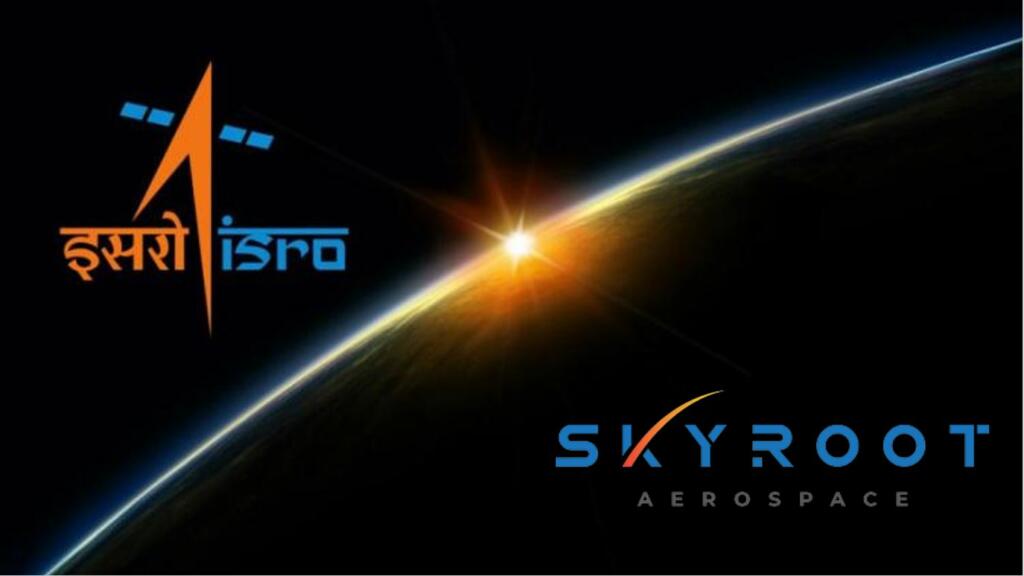In a pathbreaking development, the Indian Space Research Organisation (ISRO) has entered into a framework memorandum of understanding (MoU) with Hyderabad-based spacetech startup Skyroot Aerospace, allowing the private player access to ISRO’s facilities and expertise towards the development and testing of subsystems and systems of space launch vehicles. According to ISRO, the Framework MoU will enable Skyroot Aerospace to undertake multiple tests and access facilities at various ISRO centres and also enable it to avail technical expertise of ISRO for testing and qualifying their space launch vehicle systems and subsystems.
With the MOU, Skyroot has become the first private company to formally enter into an agreement with ISRO. Skyroot is backed by the promoters of renewable energy firm Greenko Group, explosives manufacturer and ISRO supplier Solar Industries and Curefit founder Mukesh Bansal. In December last year, Skyroot had announced a successful test firing of its solid propulsion rocket stage named Kalam-5. The private spacetech company was founded in 2018 by former ISRO scientists Pawan Kumar Chandana and Naga Bharath Daka.
DoS has today, September 11, 2021 entered into a Framework MoU with M/s Skyroot Aerospace Pvt. Ltd., Hyderabad for access to ISRO facilities and expertise towards the development and testing of subsystems/systems of Space Launch Vehicles.
Details: https://t.co/OIO85tvjzw pic.twitter.com/WjogqcCDeB— ISRO (@isro) September 11, 2021
Why the MoU between ISRO and Skyroot is Refreshing?
Indian startups are heavily service-oriented. Indian startups thrive on the e-commerce model, from 1-milligram medicines to furniture; they all relate to providing something to consumers in exchange for money. Not many startups focus on building unconventional products. For example, space exploration and space tech are something in which a handful of Indian startups have engaged themselves. Among them, Skyroot is the first to crack a deal with ISRO. Here on, the Indian space startup scene will definitely witness an upswing, as ISRO and the Department of Space have both conveyed their willingness to help out and aid budding companies who have a keen interest in space.
In June 2020, the Modi government had approved the creation of a new organisation to ensure greater private participation in India’s space activities. The Indian National Space Promotion and Authorisation Centre (IN-SPACe) was meant to assess the needs and demands of private players, including educational and research institutions, and explore ways to accommodate these requirements in consultation with ISRO. It seems the body has begun working, and the results are out for all to see. While Skyroot is the first private player to partner with ISRO for its projects, it will definitely not be the last – and that is something that promises to push India’s space programme to greater heights.
Why the Mou between ISRO and Skyroot is Revolutionary?
The involvement of private players in India’s space exploration and advancement journey would mean that such companies would rise to give competition to the likes of Blue Origin, Virgin Galactic, Sierra Nevada Corporation, SpaceX, and others. It would also place India on the global space map, as a country whose time for space exploration has truly come. ISRO on its own cannot possibly undertake a variety of missions. However, private players can, and India can still be made proud. Therefore, India’s space portfolio is set to witness diversification, and that is something every Indian should be proud of.
The agreement between ISRO and Skyroot will also motivate others to develop space-centric startups. India’s push for greater private involvement in the space sector could not have come at a better time. Now, not only will India be able to diversify its involvement in space, but its startups will also be motivated to try something new and non-service oriented.
The demand for space-based applications and services is growing within India, and ISRO is by itself unable to cater to the unprecedented rise in demand. The need for satellite data, imageries and space technology now cuts across sectors, from weather to agriculture to transport to urban development, and the involvement of private players has now become a necessity. The MoU goes a long way in convincing budding entrepreneurs to take their chances with the space sector, which is why the agreement between ISRO and Skyroot is revolutionary.
